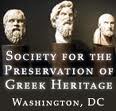Jason and Ralph will be speaking Friday, June 10 in Orlando at IRE, the annual gathering of investigative reporters. Our topic is how to find loot at your local museum.
You don’t have to be an investigative reporter to find looted antiquities. Museums around the country are home to ancient art of questionable origins. As Marion True once told her museum colleagues: “Experience has taught me that in reality, if serious efforts to establish a clear pedigree for the object’s recent past prove futile, it is most likely — if not certain — that it is the product of the illicit trade and we must accept responsibility for this fact.” (p. 190 of Chasing Aphrodite)
So, in that spirit, here are five things to look for at your local museum:
1. The Usual Suspects:For decades, the market in Classical antiquities

Robert Hecht poses in front of the famous looted Greek vase he sold the museum in 1972 for $1 million.
was controlled by a handful of shady dealers who operated much like a cartel. They were competitors, but cooperated as necessary to get the highest price for their wares. Look for their names in the ownership histories of ancient art: Robert Hecht, Frieda Tchakos, Fritz Burki, Gianfranco Becchina, Robin Symes, Christo Michaelidis.
2. Read the Labels: Many museums are frustratingly vague about an object’s origins. In the language displayed next to a piece of ancient art, you’ll find see something like “said to be from” this or that country or region. The question to ask is: who said? The answer is often dealers, middlemen and even looters. Curators often sought out this important information from their market sources, but kept it vague to hide an object’s illicit origins.
3. Accession numbers: Most museum objects are identified by an accession number, the inventory number given to an object when it enters the collection. Every museum uses a different code for their acquisitions, but they usually contain the date of acquisition. For example, the Getty’s statue of Aphrodite was 88.AA.76. “88” is for 1988, the year the Getty acquired the statue. “AA” is the Getty’s code for ancient statues. “76” tells you its the 76th acquisition of the year. This can be key information. For example, if you know the year an object was acquired, you can figure out the standards and policies that were in place at the time.
4. Scrutinize the donors. Museums have been getting in trouble for donations for decades. Donations of art are tax deductible, and have often been a means for tax fraud at museums. Museums have also used donors to launder recently looted art. (See Chap 2: A Perfect Scheme) Some museums have lower standards when it comes to objects donated to the museum.
5. Ask for answers: Once you see an object the sparks your curiosity, ask the museum for answers about the object’s provenance, or ownership history. Most museums should (reluctantly) provide you with what they know. If they claim to have no information, ask them why they felt it was safe to purchase. The AAMD has guidelines for museum transparency on these issues. Is your museums following them?
In our view, not all looted antiquities need be returned to the country from which they were stolen. (The Getty, for example, returned only a fraction of the hundreds of objects in their collection its former curator would consider “almost certainly looted.”) But museums should be asked to come clean about their collecting practices.
Joining us on Friday’s panel will be Lee Rosenbaum of CultureGrrl fame, and James Grimaldi, the WaPo’s lead reporter on the Smithsonian’s shenannigans.


 January 24th: The National Press Club.
January 24th: The National Press Club.



